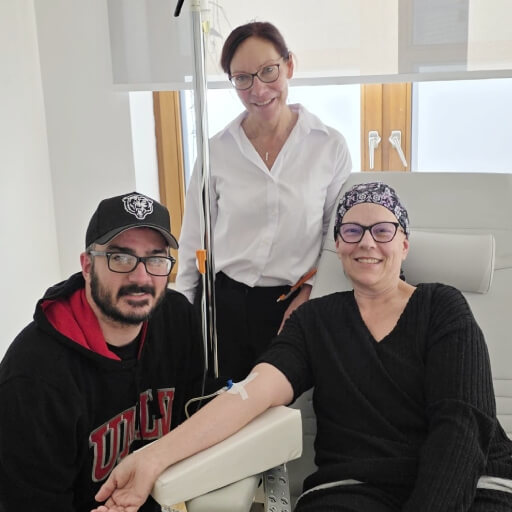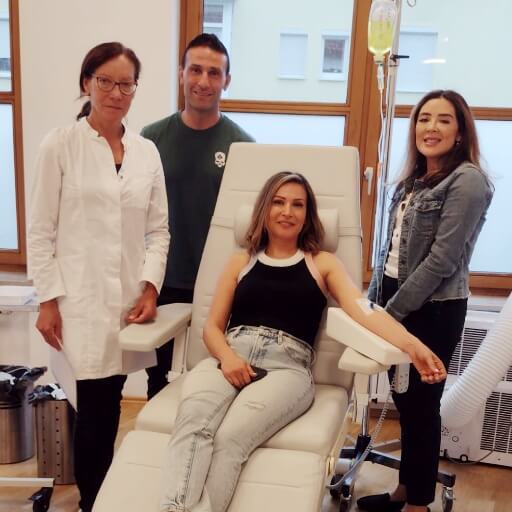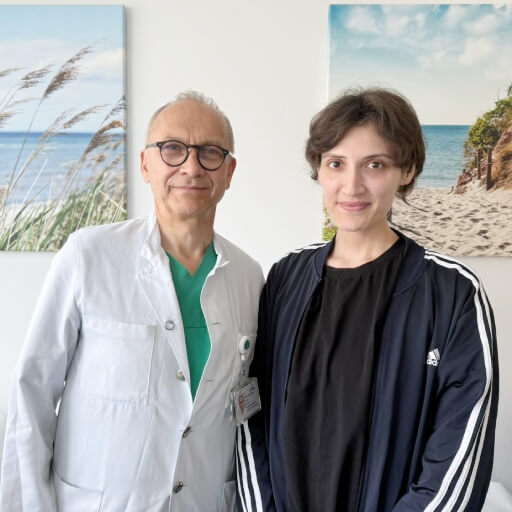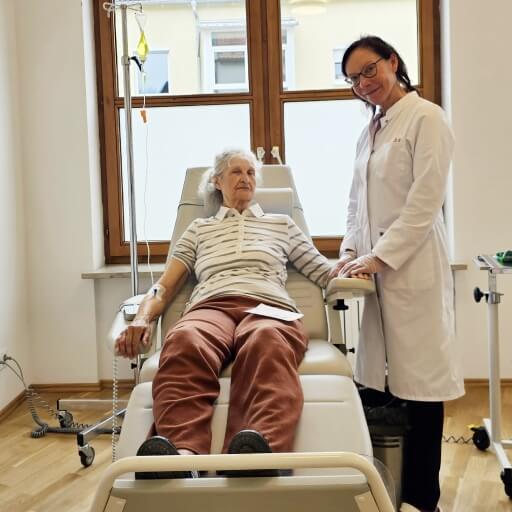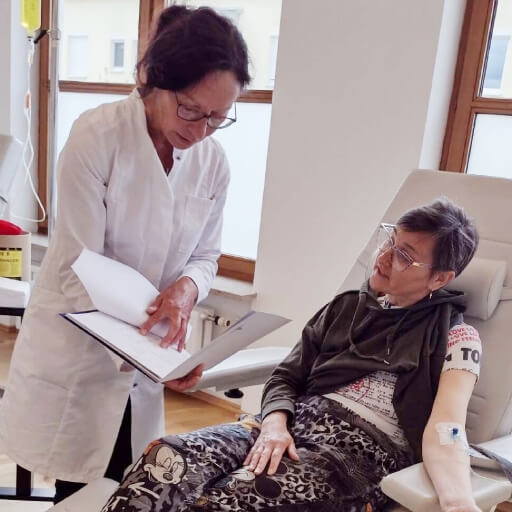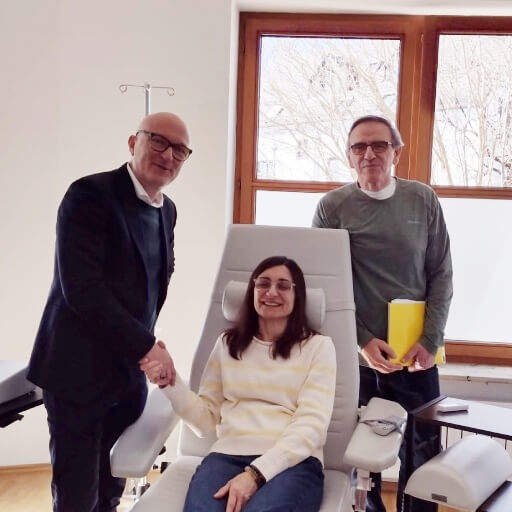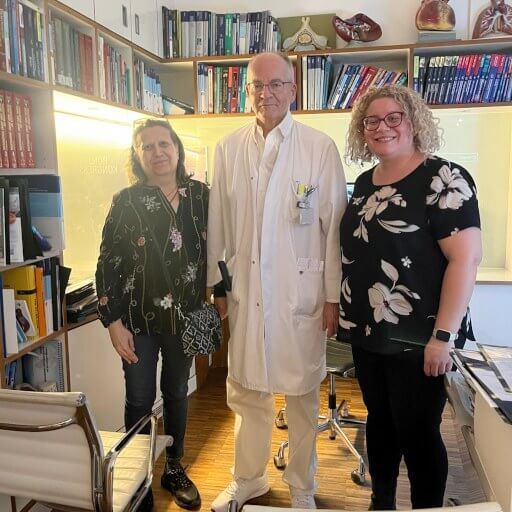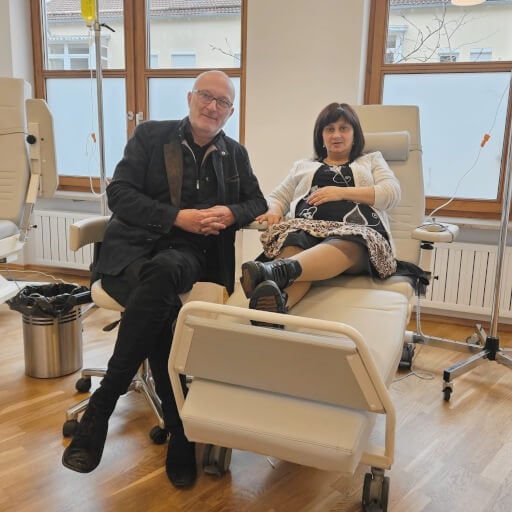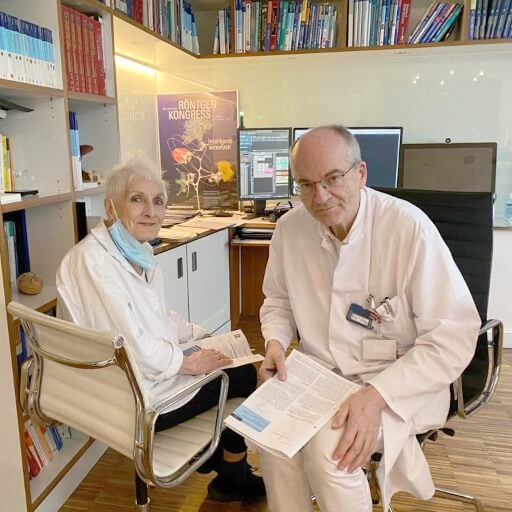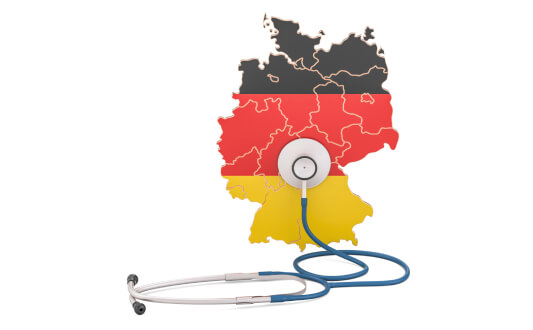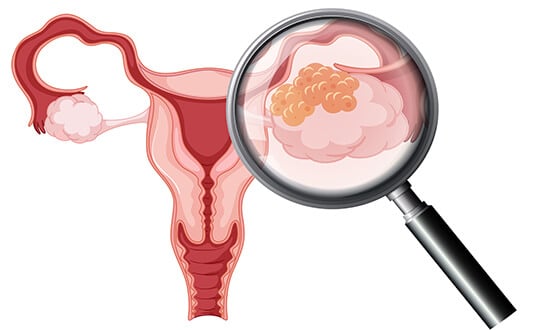Ovarian cancer is one of the most common gynecologic cancers, it ranks second in incidence among all types of cancer. It is most often diagnosed in women over 40-45 years old. Screening and increased awareness are crucial in detecting ovarian cancer early before it reaches stage 4, a terminal phase often accompanied by severe pain and limited treatment options. When undergoing treatment in Europe, doctors use the very latest treatment methods for stage 4 cancer, which allows them to increase the life expectancy of patients and give a good prognosis. Advanced European treatment protocols improve 5-year survival rates for stage 4 ovarian cancer patients by 38-55%.
Classical treatment methods for stage 4 ovarian cancer and their disadvantages
Stage 4 ovarian cancer is characterized by metastases in distant organs (stomach, liver parenchyma, lymph nodes) as well as by the presence of malignant cells in the pleural fluid and the invasion of the primary tumor into the rectum.
The cornerstone approaches in the treatment of advanced ovarian cancer, when a tumor is no longer localized, consist of chemotherapy and surgery. Radiation therapy for stage 4 ovarian cancer is reserved for specialized situations where targeted symptom control is required or where chemoresistant focal disease requires local management.
However, the use of classical medical protocols is associated with the following significant limitations:
- Chemotherapy drugs are highly toxic and indiscriminately affect not only malignant cells but also healthy ones, leading to profound immunosuppression, myelotoxicity, and organ damage
- Surgical intervention does not allow the surgeons to remove all microscopic tumor foci, and therefore, there is a high possibility of recurrence (up to 70% within 2 years)
- All treatment protocols are quite expensive
Leading European hospitals have developed improved surgical techniques, local interventions, and targeted anticancer therapy modalities. They demonstrate superior survival rates and are substantially more effective than classical protocols.
Modern treatment methods for stage 4 ovarian cancer in Germany
The treatment of the fourth stage ovarian cancer is aimed at prolonging and improving the quality of life of patients and preventing or eliminating the development of complications. As conventional therapies may not be effective at this advanced stage, many patients seek specialized care beyond standard protocols, including enrollment in clinical trials for innovative approaches. To provide successful treatment, Germany uses advanced methods such as targeted molecular therapies, precision embolization of metastases, comprehensive cytoreductive surgery, personalized systemic anticancer therapy, and numerous adjunctive interventions. The choice of therapeutic tactics depends on the type and size of the neoplasm, histological subtype, genomic profile, and individual patient factors.
Cytoreductive surgery and hyperthermic intraperitoneal chemotherapy (HIPEC) for stage 4 ovarian cancer
German surgical oncology centers perform precision-guided cytoreductive surgery as the first step of the complex stage 4 ovarian cancer treatment. This critical procedure involves the complete removal of all visible tumor foci and metastases throughout the abdominal cavity with microscopic margin assessment.
Thorough cytoreductive surgery significantly reduces tumor burden, relieves symptoms caused by the mass effect of tumors, creates optimal conditions for subsequent treatments, and markedly improves survival outcomes. This is essential before proceeding with HIPEC to maximize treatment effectiveness.
Hyperthermic intraperitoneal chemotherapy (HIPEC) is an innovative, local chemotherapy technique, which is used to prevent the repeated development of the tumor after cytoreductive surgery. The essence of the procedure is that the abdominal cavity is washed using drainage systems, with a solution of chemotherapy drugs heated to 40-42 °C. This allows for the achievement of the following effects:
- The local use of a high concentration of chemotherapy drugs, which cannot be done when conducting systemic chemotherapy, due to its excessive toxicity;
- The high temperature of the solution enhances the antitumor properties of the drugs and the drugs can better penetrate into the cancer cells;
- The drugs remain in the ovarian tissues for a long time and continue to act without causing side effects or the impairment of healthy organs.
The duration of the procedure is from 30 to 90 minutes. Studies have demonstrated a dramatic difference in survival rates for stage IV cancer patients: those receiving HIPEC show a 75% survival rate, compared to only 18% for patients who undergo surgery without this additional treatment – representing a more than four-fold improvement in outcomes.
HIPEC in Clinical Practice: Insights from a Leading Expert
To provide deeper insights into this groundbreaking treatment, we spoke with Dr. Michael Lipp, a leading expert in HIPEC procedures at Asklepios Hospital Barmbek Hamburg. In Germany, ovarian cancer and other peritoneal malignancies are increasingly being treated with this innovative approach, which combines surgical expertise with targeted chemotherapy. For patients with stage IV ovarian cancer, HIPEC offers a particularly promising option, showing significant survival benefits compared to traditional treatments. Dr. Lipp's extensive experience performing weekly HIPEC procedures and his specialized focus on peritoneal surface malignancies make him uniquely qualified to discuss the intricacies of this treatment. In this comprehensive interview, he shares valuable insights about the procedure's technical aspects, its evolution in recent years, and the remarkable outcomes he's witnessed in his practice.
Leading German Surgeon Dr. Lipp Reveals the Power of HIPEC in Cancer Treatment
Embolization of metastases in stage 4 ovarian cancer in Germany
Metastatic ovarian cancer often spreads tumor foci into the liver parenchyma. One of the options for their control is hepatic artery embolization. This method consists of blocking the blood flow in the vessel, which stops the blood supply to the metastases. For this purpose, various chemical agents (emboli) are used.
Embolization in liver metastases has the following advantages:
- Rapid reduction of tumor size or metastatic lesions;
- Minimal invasiveness – the procedure is performed through a small incision in the groin using a catheter;
- Good tolerability of the procedure;
- The possibility of repeated use of the procedure;
- Preservation of liver function – healthy parenchyma receives most of the blood from the portal vein, whilst the tumor receives 95% of its blood from the hepatic artery.
German hospitals are increasingly using transarterial chemoembolization – a type of embolization that applies microspheres imbued with chemotherapy drugs as emboli. When using the procedure, the therapeutic effect is achieved due to the following two mechanisms:
- Poor blood supply – cancer cells die quickly since the vessels feeding them are blocked;
- Effect of chemotherapeutic agents – chemotherapy drugs are evenly released from microspheres for several weeks and suppress the vital activity of cancer cells.
Clinical data from German centers shows this approach reduces tumor burden by 40-60% in most patients. The 2-year survival rate increases from approximately 30% to 50% for patients with limited liver metastases. Chemoembolization in the treatment of ovarian cancer with liver metastases can be indicated as a choice for patients who have contraindications for surgical removal of the tumor.
Prof. Kovács: When to Use DEB-TACE, Conventional TACE, or Radioembolization (TARE)
Electrochemotherapy for stage 4 ovarian cancer
Electrochemotherapy (ECT) works by making cancer cells more vulnerable to chemotherapy through electrical pulses. Think of it like opening doors in tumor cells that are normally locked – once open, chemotherapy floods in at concentrations that destroy the cancer.
The procedure combines two techniques: electro-chemotherapy uses precisely positioned electrodes to create electrical fields around tumors, making cell membranes permeable. Then isolated perfusion delivers high-dose chemotherapy directly to the abdomen through arterial catheters – just imagine that drugs reach tumor at 10-20 times higher concentration than IV chemotherapy.
Performed under general anesthesia, the procedure takes about 2 hours including blood filtration to remove excess drugs. Patients walk around the same day. That is a crucial difference from conventional chemotherapy – minimal side effects because treatment is localized and drugs are filtered out. According to the clinical trial, stage IV patients achieved 10.9 months median survival (refractory cases), 74% improved quality of life – which is quite significant [1].
Electrochemotherapy cost is available through Booking Health; you can check the cost of electrochemotherapy details for your specific case.
Regional chemotherapy for ovarian cancer stage 4
Regional chemotherapy in Germany treats stage IV ovarian cancer differently than standard chemotherapy. Instead of diluting drugs throughout entire body (that is up to 5-7 liters of blood!), treatment isolates the abdomen and delivers concentrated chemotherapy directly where cancer lives.
For stage 4 ovarian cancer regional chemotherapy hypoxic isolated perfusion is used: blood flow to abdomen is temporarily separated from rest of body, high-dose chemotherapy is administered for 15 minutes, then special filtration removes drugs before they reach other organs. This protects heart, kidneys, bone marrow from toxicity while exposing tumor to lethal drug concentrations.
And why do we need hypoxia? The point is that certain chemotherapy chemo drugs become multiple times more toxic to cancer under low-oxygen conditions. Regional chemotherapy for ovarian cancer stage 4 exploits this to reach the desired result.
You can find more info about ECT and regional chemo from the interview with an expert – Prof. Aigner from Medias Klinikum Burghausen, who has been working on these methods for over 4 decades.
Targeted therapy for the treatment of stage 4 ovarian cancer in Germany
The method of targeted therapy is based on the use of drugs that affect the molecular mechanisms of the proliferation and division of cancer cells. Such drugs are selected individually, depending on the presence and type of mutations in the tumor cells. In stage 4 ovarian cancer, this treatment is used in combination with systemic chemotherapy to reduce the size of the tumor and its metastases.
Targeted therapy can be indicated for patients, if:
- Cytoreductive surgery has not been performed;
- Their tumor foci have a diameter of more than 1 cm and remain after cytoreduction.
When treating metastatic ovarian cancer, the doctors most often use angiogenesis inhibitors. These are drugs that block the formation of new vessels supplying the tumor. These are mostly antibodies that affect the VEGF protein. The course includes about 20 injections of drugs, which are administered intravenously once every 3 weeks.
Some patients may be prescribed PARP inhibitors. These are drugs that interfere with the restoration of DNA in the cancer cells after chemotherapy. These medicines are prescribed as pills or capsules in the case of detection of patient-specific mutations in the BRCA genes.
NTRK mutations are rare. The drugs from the group of tropomyosin receptor kinase inhibitors are most suitable for such patients. They block the activities of growth factors that are required for cell survival and division. These drugs are manufactured as pills.
Immunotherapy for the treatment of stage 4 ovarian cancer in Germany
The field of immunotherapy has been dramatically transformed by groundbreaking scientific research. In 2011, the Nobel Prize in Medicine was awarded to Ralph Steinman for his revolutionary discovery of dendritic cells, which fundamentally reshaped our understanding of the immune system and paved the way for innovative cancer treatments. Immunotherapy for ovarian cancer includes several innovative approaches that are transforming treatment outcomes:
- Personalized dendritic cell vaccines. This method works by training the patient's immune system to recognize and attack cancer cells. Clinical trials have shown these vaccines can increase progression-free survival by 40-70% and improve overall 2-year survival rates by up to 75% compared to standard treatments. It is well-tolerated with minimal side effects and shows particularly promising results in disease control. Steinman's pioneering work on dendritic cells has been instrumental in developing these sophisticated immunotherapeutic strategies, highlighting the critical role of these unique immune cells in targeting and eliminating cancer cells.
- Immune checkpoint inhibitors. These drugs block protein molecules that help tumors evade immune response. Currently used mainly in clinical investigations, they show positive results in up to 15% of cases.
- Adoptive cell transfer (T-cell vaccines). This approach involves modifying the patient's own immune cells to enable targeted attack against cancer cells, demonstrating encouraging results in clinical studies.
Among these methods, dendritic cell vaccination stands out for its potential to extend the survival rate while maintaining quality of life, particularly when integrated into a comprehensive treatment strategy.
Modern Cancer Immunotherapy: Dendritic Cell Vaccination
At the LDG Laboratories Cancer Clinic in Germany, a groundbreaking approach to immunotherapy is transforming patient outcomes. Leading this innovative work is Professor Frank Gansauge, whose 22-year journey in dendritic cell therapy has helped numerous patients, including those with ovarian cancer 4th stage. In this revealing interview, Prof. Gansauge steps away from technical discussions to share candid insights about patient selection, treatment personalization, and the human aspects of immunotherapy. His perspective offers a refreshing look at how this sophisticated biological treatment works in real-world clinical settings, where each patient's story shapes the therapeutic approach.
Expert Insights from Prof. Gansauge: The Power of Dendritic Cell Therapy in Cancer Treatment
Treatment Effectiveness in Stage 4 Ovarian Cancer: Comparing Modern vs Traditional Approaches
Understanding the comparative effectiveness of different treatment options is crucial for making informed decisions about cancer care. Below, we present a comprehensive comparison of various treatment methods, including both traditional and innovative approaches.
| Treatment | Quality of Life Score (1-10) | 2-Year Survival Rate* | Response Rate** | Cost of treatment, €*** |
|---|---|---|---|---|
| Surgery | 3-4 | up to 30% | up to 25% | 50,000 - 88,000 |
| HIPEC | 7-8 | up to 75% | up to 80% | 55,000 - 75,000 |
| Chemoembolization | 7-8 | up to 50% | up to 80% | 6,500 - 24,000 |
| Classical Chemotherapy | 4-5 | up to 30% | up to 20% | 80,000 - 150,000 for the full course |
| CAR T-cell therapy | 6-7 | up to 40% | up to 40% | 450,000 - 550,000 |
| Dendritic Cell Immunotherapy | 9-10 | up to 75% | up to 90% | 20,000 - 38,000 |
*Booking Health data. Survival rates vary widely depending on the type of cancer, the patient's condition, and specific circumstances.
**Booking Health data. Response rate is the number of patients who show improvement after treatment.
***The cost of treatment depends on the type of tumor, stage of cancer, and other factors.
The best hospitals for treatment of 4 stage ovarian cancer
Medicine in Germany is constantly developing and is available to patients from any country in the world. The treatment of stage 4 ovarian cancer is, in most cases, successful. Upon the completion of treatment, many people live more than 5 years. This is possible due to the following aspects:
- Top-class specialists – each doctor undergoes specialized training and medical practice in the best health facilities in the world. This allows them to perform minimally invasive procedures and surgery of any complexity;
- Technical equipment at the hospitals – the medical facilities use modern equipment, which allows the surgeons to perform minimally invasive, organ-preserving surgery with minimum risks of complications;
- Advanced treatment methods – new treatment protocols are constantly being developed and introduced into clinical practice, which increases the effectiveness of therapy.
One can undergo specialized treatment of ovarian cancer in more than 70 German hospitals.
| Hospital | Department |
|---|---|
| University Hospital Tuebingen | Department of Adult and Pediatric Gynecology, Mammology, Obstetrics offers classic therapeutic protocols and own developments for the treatment of advanced ovarian cancer. The head of the department, Professor Diethelm Wallwiener, is the representative of the working group Gynecological Oncology (AGO) in the Clinical Research Commission. |
| University Hospital Frankfurt | Department of Adult and Pediatric Gynecology, Obstetrics and Mammology offers comprehensive gynecologic oncology services and is certified by the German Cancer Society. The team specializes in both surgical and conservative treatment approaches for stage 4 ovarian cancer, including targeted therapy and innovative surgical techniques. |
| Asklepios Hospital Barmbek Hamburg | Department of Gynecology is part of the Cancer Center certified by the German Cancer Society (DKG). The department specializes in advanced ovarian cancer treatment using cytoreductive surgery and offers minimally invasive and robot-assisted da Vinci surgical techniques. |
| University Hospital Rechts der Isar Munich | Department of Gynecology, Mammology and Obstetrics is part of the specialized oncology center, where gynecologists, oncologists, surgeons, radiation therapists, specialists in the field of nuclear medicine, and psychologists cooperate. The department also carries out genetic tests for more individual therapy planning. |
| Helios Hospital Berlin-Buch | Department of Gynecology, Mammology and Obstetrics is certified by the German Cancer Society as a Center for Gynecological Oncology. The head physician of the department, Professor Michael Untch, is a member of the Guideline Development Committee of the Working Group on Gynecological Oncology. |
| LDG Laboratories Dr. Gansauge Berg | Department of Oncology and Dendritic Cell Therapy specializes in innovative LANEX-DC® dendritic cell immunotherapy for advanced ovarian cancer. Led by Prof. Dr. med. Frank Gansauge, the team offers this advanced therapy for patients who have not responded to standard treatments. The department's EU-GMP certified laboratory is the only one worldwide that uses non-frozen cells, preserving all beneficial properties for maximum therapeutic effect. |
How to undergo treatment of stage 4 ovarian cancer in Germany?
To undergo high-quality treatment of stage 4 ovarian cancer in the leading oncology hospitals in Germany, you can use the services of Booking Health – the official medical tourism organizer.
Booking Health provides the following services:
- Personalized selection of a diagnostic and treatment program in a specialized German hospital;
- Preparation of a medical program, taking into account any previously performed diagnostic and therapeutic procedures;
- Provision of minimum cost treatments – prices will be reduced due to the lack of additional coefficients for foreign patients;
- Organization of a preliminary consultation with a doctor;
- Doctor's appointment on the most suitable date;
- Preparation of documents and insurance against unforeseen complications;
- Quality control of the medical program at all its stages;
- Monitoring of invoices and return of any unspent funds;
- Assistance in buying and forwarding medicines;
- Prompt organization of additional procedures and follow-up rehabilitation;
- Buying airline tickets, booking an apartment or a hotel, meeting you at the airport, and transfers;
- Communication with the treating oncologist after returning to your native country.
You can find out more information about the treatment programs and the average cost of treatment by sending your request on the official bookinghealth.com website.
Modern Cancer Treatment: Patient Journeys with Booking Health
Frequently asked questions of our patients about stage 4 ovarian cancer
Send request for treatmentTreatment options include chemotherapy, targeted therapy, immunotherapy, and palliative care. German clinics may also offer advanced treatments like HIPEC (hyperthermic intraperitoneal chemotherapy) and clinical trials for new therapies.
Benefits include access to cutting-edge treatments, experienced specialists, and comprehensive care plans tailored to individual patient needs. German clinics often offer innovative therapies and clinical trials not widely available elsewhere.
Effectiveness is monitored through regular imaging tests, blood tests, and clinical evaluations. These assessments help doctors determine the impact of the therapy and make necessary adjustments.
Risks depend on the specific treatment but can include side effects such as nausea, fatigue, and increased susceptibility to infections. Close monitoring and supportive care help manage these risks.
While a cure for stage 4 ovarian cancer is rare, advanced treatments in Germany can help manage the disease, prolong life, and improve quality of life. Treatment aims to control the cancer and alleviate symptoms.
While stage 4 ovarian cancer presents significant challenges, advanced treatments in German clinics can help extend life expectancy. For example, combining HIPEC with cytoreductive surgery significantly improves survival rates from 18% to 75%.
The best hospital in Germany for ovarian cancer treatment often includes leading institutions like Helios Hospital Berlin-Buch, Asklepios Hospital Barmbek Hamburg, and University Hospital LMU Munich. These centers are known for advanced technologies, multidisciplinary teams, and high survival outcomes in complex cases like stage 4 ovarian cancer.
The ovarian cancer treatment cost in Germany varies depending on the clinic and treatment plan. On average, stage 4 treatment costs range from €30,000 to €60,000, but may exceed €100,000 when advanced therapies like HIPEC or dendritic cell therapy are included.
Yes, remission of stage 4 ovarian cancer is possible, especially with timely and comprehensive treatment. While cure is rare at this stage, remission can be achieved with a combination of surgery, chemotherapy, and targeted therapies, leading to improved survival and quality of life.
Yes, HIPEC for ovarian cancer in Germany is available at specialized clinics. It involves administering heated chemotherapy directly into the abdominal cavity after surgery and is particularly beneficial for advanced-stage patients, including those with peritoneal spread.
Yes, dendritic cell therapy for ovarian cancer in Germany is offered in select certified clinics. It is a form of personalized immunotherapy that trains the patient's immune system to recognize and fight cancer cells, and it is often used in combination with conventional therapies.
Chemotherapy for stage 4 ovarian cancer typically involves a combination of agents that work to damage cancer cells and prevent their growth. These treatments are often administered in cycles and may be adjusted based on the cancer's response or if it recurs. In recurrent cases, alternative formulations or targeted agents may be added to improve effectiveness.
Cancer treatment in Germany for foreigners starts with selecting a clinic, submitting medical records, and receiving a personalized treatment plan. Booking Health and similar coordinators assist with visas, appointments, interpreter services, and logistics to ensure a smooth treatment journey.
These are abdominal or pelvic pain, loss of appetite, weight loss, and other symptoms connected with metastasis spread.
HIPEC gives a score of about 7-8 out of 10 due to targeted action and fewer systemic effects. Chemoembolization also provides around 7-8 – it is minimally invasive and preserves organ function. Dendritic cell immunotherapy reaches 9-10, offering the best quality of life.
With HIPEC, the 2-year survival rate can reach 75%; chemoembolization shows around 50%, and dendritic cell vaccination – up to 75% in selected patients.
HIPEC provides up to 80% response rate due to physical metastasis removal and high chemo drugs concentrations. Chemoembolization achieves similar results, around 80%. Dendritic cell immunotherapy demonstrates the highest response rate of up to 90%.
In Germany advanced ovarian cancer treatment combines HIPEC, PIPAC, dendritic cell therapy, regional chemotherapy and interventional radiology – treatment plans are personalized to the patient’s tumor profile and overall health.
Choose treatment abroad and you will be sure to get the best results!
Authors:
This article was edited by medical experts, board-certified doctors Dr. Nadezhda Ivanisova, and Dr. Bohdan Mykhalniuk. For the treatment of the conditions referred to in the article, you must consult a doctor; the information in the article is not intended for self-medication!
Our editorial policy, which details our commitment to accuracy and transparency, is available here. Click this link to review our policies.
Sources:
Read:
Treatment of Gynecological Diseases in Germany
Article menu:
- Classical treatment methods for stage 4 ovarian cancer and their disadvantages
- Modern treatment methods for stage 4 ovarian cancer in Germany
- Cytoreductive surgery and hyperthermic intraperitoneal chemotherapy (HIPEC) for stage 4 ovarian cancer
- Embolization of metastases in stage 4 ovarian cancer in Germany
- Electrochemotherapy for stage 4 ovarian cancer
- Regional chemotherapy for ovarian cancer stage 4
- Targeted therapy for the treatment of stage 4 ovarian cancer in Germany
- Immunotherapy for the treatment of stage 4 ovarian cancer in Germany
- Treatment Effectiveness in Stage 4 Ovarian Cancer: Comparing Modern vs Traditional Approaches
- The best hospitals for treatment of 4 stage ovarian cancer
- How to undergo treatment of stage 4 ovarian cancer in Germany?
- Frequently asked questions of our patients about stage 4 ovarian cancer
Don't know where to start?
Contact Booking Health
